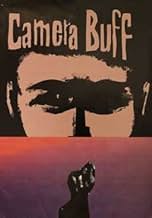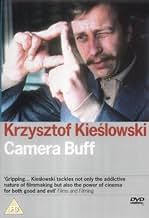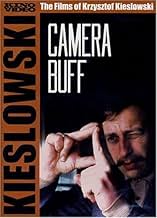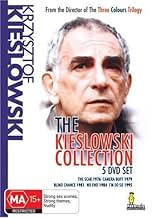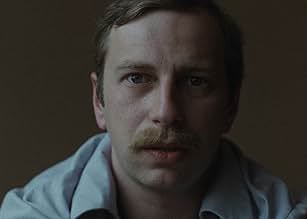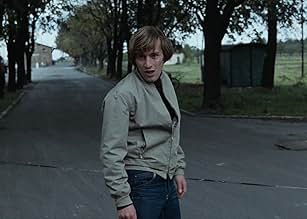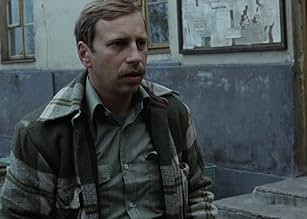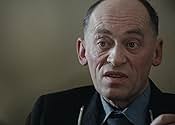NOTE IMDb
7,8/10
8,9 k
MA NOTE
Un simple ouvrier d'usine achète un appareil photo à l'occasion de la naissance de son enfant. Les autorités lui ordonnent de réaliser des documentaires sur le succès de l'usine.Un simple ouvrier d'usine achète un appareil photo à l'occasion de la naissance de son enfant. Les autorités lui ordonnent de réaliser des documentaires sur le succès de l'usine.Un simple ouvrier d'usine achète un appareil photo à l'occasion de la naissance de son enfant. Les autorités lui ordonnent de réaliser des documentaires sur le succès de l'usine.
- Réalisation
- Scénario
- Casting principal
- Récompenses
- 6 victoires au total
Avis à la une
Jerzy Stuhr buys an 8mm film camera to film his newborn daughter. The manager of the plant he works at hears about it, and tells him to shoot a film about the plant's 25th anniversary. Stuhr figures out the basics of editing, but the director suggests changes he doesn't like. Ignoring this, he takes the film to an amateur festival and wins a prize. As his obsession with film grows, his wife, Malgorzata Zabkowska, suffers postpartum depression, exacerbated by the realization that the things he had once wanted -- her, a daughter, a quiet life -- are no longer his goals.
Krzysztof Kieslowski's third feature is a meditation on the power of film and the inability of a finite work of art to accurately reflect the infinite world, or even the myriad complications of a small town. As Stuhr's skills and connections grow, he comes to see everything through an imaginary camera lens, not seeing anything outside his self-imposed frame. Beautifully shot by five cameramen, dialogue by Stuhr, make this a fine journey of self-discovery.
Krzysztof Kieslowski's third feature is a meditation on the power of film and the inability of a finite work of art to accurately reflect the infinite world, or even the myriad complications of a small town. As Stuhr's skills and connections grow, he comes to see everything through an imaginary camera lens, not seeing anything outside his self-imposed frame. Beautifully shot by five cameramen, dialogue by Stuhr, make this a fine journey of self-discovery.
There are times in our lives that a minor event becomes a biggest event, something that change your life for good or bad, but it's something that makes what you are and defines your whole journey through life. To me this thing was movies. Since I was kid I watched movies but I didn't have a greater perception of what movies were and their meaning, all I know is that I liked for some reason. When I grow older I noticed that is something very important to me and it was something that I couldn't live without, to remember good cinematic moments and to see a different look through our reality, to have different and pleasant experiences.
Since I'm talking about movies and turning points in someone's life, Krzysztof Kieslowski's "Amator" is a brilliant and deep look into the life of a man who accidentally became a filmmaker. Here, Filip Mosz (Jerzy Stuhr) is a happy man that awaits the birth of his first child and he buys a camera to film the event. After that he realizes that he created a magical world through what he filmed, he notices that everything is different, beautiful behind the lens of a camera and starts to make simple documentaries, filming his friends, his neighborhood and everything he finds interesting to film.
But one day someone told to his boss that he has a camera and he needs the camera because the Comunist Party wants to film a celebration of a great event in the town. Since Filip is a State civil servant (working in a factory) he's almost forced to film the event (he's the only person in the whole city to have a 8mm camera). What is interesting here is that Filip enjoyed filming the celebration, doing a great job that caught the attention of his bosses and his friends and that led his film to be registered into a film festival for amateur filmmakers. Filip sudden success makes him moving forward in the making of all sorts of documentaries, one of this documentaries features an midget hard working colleague of Filip in the leading role, something that his bosses doesn't want to be filmed, after all Filip's films are sponsored by the Comunist Party and they don't want to get involved with supposed controversial subjects. Here starts Filip's problems, because now he has a conscience about the power of movies, the influence that his documentaries has in people's lives, in the government, and what it's images may cause to his family and his friends. Is it possible that people can respect and accept what you do even if what you do it's something that pushes away from all the people you love and care? Is Filip a responsible filmmaker or he's just pretending to be someone he's not to get attention? What is best: to be truthful to yourself and lie to others to have good relations or be truthful to everyone and be hated for it? Many questions to be answered by the viewers in this exciting and wonderful film.
Kieslowski knows exactly what's he doing here. This story hands perfectly well to him not only because he's a great artist that deal with many obstacles to make his movies. No, he started filming documentaries,pretty much in what Filip does, filming for the Comunist Party in Poland. In one of the documentaries he accidentally filmed an killing, then his bosses were told and started to control all of his films since then. His first films were censored during the 1970's and beginning of 1980's so in "Amator" we know what he's saying about the control of what filmmakers can do or not. If you are familiar with his first films you can notice that in almost all of it he criticizes the government in one way or another, his attacks are very sharp, very subtle in films like "Bez Konca". With the Trilogy of Colors, "A Short Film About Love" and the "Dekalog" you'll see that he's a more artistic creator. But as in all of his films he's got the partnership of the writer Krzysztof Piesiwicz, a great collaborator.
The acting here is great: Jerzy Sthur in the leading role is awesome. His quietness and strange manners put him in the same type of a Carlitos the Chaplin character, sometimes he's funny, other times he's very impulsive. Malgorzata Zabkowska plays Filip's conflicted wife, a woman that wants the attention of his husband that seems to care more about his movies than to health of his child. In the role of Witek, Filip's best friend and supporter, Tadeusz Bradecki gives a very good performance, showing the limits of what a man can do to a friend and what he won't do. When the movie becomes too slow and sometimes depressive Witek appears to show a little bit of humor.
Another great and reflective work from the fantastic director Kryzsztof Kieslowski, a must see film for those who admires his films, and for those who love movies as I do. 10/10
Since I'm talking about movies and turning points in someone's life, Krzysztof Kieslowski's "Amator" is a brilliant and deep look into the life of a man who accidentally became a filmmaker. Here, Filip Mosz (Jerzy Stuhr) is a happy man that awaits the birth of his first child and he buys a camera to film the event. After that he realizes that he created a magical world through what he filmed, he notices that everything is different, beautiful behind the lens of a camera and starts to make simple documentaries, filming his friends, his neighborhood and everything he finds interesting to film.
But one day someone told to his boss that he has a camera and he needs the camera because the Comunist Party wants to film a celebration of a great event in the town. Since Filip is a State civil servant (working in a factory) he's almost forced to film the event (he's the only person in the whole city to have a 8mm camera). What is interesting here is that Filip enjoyed filming the celebration, doing a great job that caught the attention of his bosses and his friends and that led his film to be registered into a film festival for amateur filmmakers. Filip sudden success makes him moving forward in the making of all sorts of documentaries, one of this documentaries features an midget hard working colleague of Filip in the leading role, something that his bosses doesn't want to be filmed, after all Filip's films are sponsored by the Comunist Party and they don't want to get involved with supposed controversial subjects. Here starts Filip's problems, because now he has a conscience about the power of movies, the influence that his documentaries has in people's lives, in the government, and what it's images may cause to his family and his friends. Is it possible that people can respect and accept what you do even if what you do it's something that pushes away from all the people you love and care? Is Filip a responsible filmmaker or he's just pretending to be someone he's not to get attention? What is best: to be truthful to yourself and lie to others to have good relations or be truthful to everyone and be hated for it? Many questions to be answered by the viewers in this exciting and wonderful film.
Kieslowski knows exactly what's he doing here. This story hands perfectly well to him not only because he's a great artist that deal with many obstacles to make his movies. No, he started filming documentaries,pretty much in what Filip does, filming for the Comunist Party in Poland. In one of the documentaries he accidentally filmed an killing, then his bosses were told and started to control all of his films since then. His first films were censored during the 1970's and beginning of 1980's so in "Amator" we know what he's saying about the control of what filmmakers can do or not. If you are familiar with his first films you can notice that in almost all of it he criticizes the government in one way or another, his attacks are very sharp, very subtle in films like "Bez Konca". With the Trilogy of Colors, "A Short Film About Love" and the "Dekalog" you'll see that he's a more artistic creator. But as in all of his films he's got the partnership of the writer Krzysztof Piesiwicz, a great collaborator.
The acting here is great: Jerzy Sthur in the leading role is awesome. His quietness and strange manners put him in the same type of a Carlitos the Chaplin character, sometimes he's funny, other times he's very impulsive. Malgorzata Zabkowska plays Filip's conflicted wife, a woman that wants the attention of his husband that seems to care more about his movies than to health of his child. In the role of Witek, Filip's best friend and supporter, Tadeusz Bradecki gives a very good performance, showing the limits of what a man can do to a friend and what he won't do. When the movie becomes too slow and sometimes depressive Witek appears to show a little bit of humor.
Another great and reflective work from the fantastic director Kryzsztof Kieslowski, a must see film for those who admires his films, and for those who love movies as I do. 10/10
Filip buys an eight-millimeter movie camera when his first child is born. Because it's the first camera in town, he's named official photographer by the local Party boss. His horizons widen when he is sent to regional film festivals with his first works but his focus on movie-making also leads to domestic strife and philosophical dilemmas.
"Camera Buff" explores censorship in Communist Poland and its repression of the individual's expression of his observations. Filip also confronts the consequences of a man who discovers new possibilities and finds his former world, which had been so fulfilling before he'd discovered filmmaking, rendered dull, old, and limited.
The story is interesting solely because of the Communist aspect. If it was just a story of man who becomes obsessed with making movies, it would be just another story about movies told in the form of a movie. But the Communist aspect? If one man in town has a camera, it suddenly becomes a tool for the entire city. It's interesting. This could be beautiful or ugly, depending on who happens to be in power.
"Camera Buff" explores censorship in Communist Poland and its repression of the individual's expression of his observations. Filip also confronts the consequences of a man who discovers new possibilities and finds his former world, which had been so fulfilling before he'd discovered filmmaking, rendered dull, old, and limited.
The story is interesting solely because of the Communist aspect. If it was just a story of man who becomes obsessed with making movies, it would be just another story about movies told in the form of a movie. But the Communist aspect? If one man in town has a camera, it suddenly becomes a tool for the entire city. It's interesting. This could be beautiful or ugly, depending on who happens to be in power.
Ah for the love of film
In 2006, I was one internet flight ticket transaction click away from moving to the area of Poland for the duration, but didn't. The "good" reason being is that I suffered some seriously grave trepidation over the fact that I would need to have two months salary in the bank before I'd EVER raise enough capital to buy an 8 mm motion picture camera. And this was in 2006. Sadly, these hypertensive concerns about finances low, all sleepless nights over equipment I don't have, and from where in the heck is the next camera going to come turned out to be relative in the scope of things in a sick and cyclical sense- and after interfacing with the characters of Kyrstof Kieslowski's incredibly moving Humanist Dark-Dramity, Camera Buff, for an hour and half, I'm just now harboring more than a few serious regrets about not actually abandoning the competitive, spiraling nightmare that is Western Life when I had the chance.
Camera Buff is a wonderful story about a factory worker Filip (Jerzy Stuhr); a man who, in his thirties, begins to see life anew through the view finder of a small gauge movie camera. Originally purchased for "two months salary," which "pissed his wife off" to document his newborn daughter's first few steps, the 8 mm camera is quickly realized as something more useful than just a device for making home-movies. The narrative's tension is organized specifically around the reaction to the films of the institutional power structures and forces around Filip that essentially commissioned, financed, and instigated the films themselves along with Filip's newly discovered and unyielding passion for creating them as he sees fit.
If you view the Kino Video DVD release of this film, perhaps even more profoundly affecting than the feature as an augury of hope for the human race is the sixteen minute black and white documentary entitled Talking Heads in which Kielowski conducts helter-skleter a multitude of fifteen second interviews about "who you are" and "what you want" with Polish citizens, age zero to one-hundred, across all walks of life starting at the year 1979 with a little gurgling baby. In all, it's wonderful material and has me seeking out more Kieslowski.
Camera Buff is a wonderful story about a factory worker Filip (Jerzy Stuhr); a man who, in his thirties, begins to see life anew through the view finder of a small gauge movie camera. Originally purchased for "two months salary," which "pissed his wife off" to document his newborn daughter's first few steps, the 8 mm camera is quickly realized as something more useful than just a device for making home-movies. The narrative's tension is organized specifically around the reaction to the films of the institutional power structures and forces around Filip that essentially commissioned, financed, and instigated the films themselves along with Filip's newly discovered and unyielding passion for creating them as he sees fit.
If you view the Kino Video DVD release of this film, perhaps even more profoundly affecting than the feature as an augury of hope for the human race is the sixteen minute black and white documentary entitled Talking Heads in which Kielowski conducts helter-skleter a multitude of fifteen second interviews about "who you are" and "what you want" with Polish citizens, age zero to one-hundred, across all walks of life starting at the year 1979 with a little gurgling baby. In all, it's wonderful material and has me seeking out more Kieslowski.
An innocent enough decision. Filip (Jerzy Stuhr) buys a camera to film his new daughter. It costs two months salary and it makes him a celebrity of sorts as he is the only one in town that has one.
Now, his boss wants him to film the 25th anniversary celebration of the company. He really gets into filming and soon runs headlong into "rules." Of course, you have rules in a communist country. His wife is not too excited about his new hobby, but he soon gets his film entered into a film festival.
Soon, like all who truly love film, Filip is attending screenings, talking to directors, and reading film magazines to improve his craft. But, more and more his wife is displeased, and his boss is cooling to the idea as he moves from filming the company to social statements.
His desire for tranquility gives way to a desire for fame and art at the cost of his wife and family.
He also discovers the unintended consequences of reporting the truth. In the end he turns the camera on himself as he realizes he had everything in the beginning and lost it all.
A fascinating look at real cinema and finding what you want.
Now, his boss wants him to film the 25th anniversary celebration of the company. He really gets into filming and soon runs headlong into "rules." Of course, you have rules in a communist country. His wife is not too excited about his new hobby, but he soon gets his film entered into a film festival.
Soon, like all who truly love film, Filip is attending screenings, talking to directors, and reading film magazines to improve his craft. But, more and more his wife is displeased, and his boss is cooling to the idea as he moves from filming the company to social statements.
His desire for tranquility gives way to a desire for fame and art at the cost of his wife and family.
He also discovers the unintended consequences of reporting the truth. In the end he turns the camera on himself as he realizes he had everything in the beginning and lost it all.
A fascinating look at real cinema and finding what you want.
Le saviez-vous
- AnecdotesThe film's opening scene and Irka's nightmare about a hawk killing a chicken are reminiscent of Ken Loach's Kes (1969) -- a film about a boy who takes to training a wild kestrel in order to escape his troubled life. Later, Filip can be seen reading a filmmaking text and turning to a section about Ken Loach and Kes (1969). This reference is twofold. First, Filip is clearly inspired by filmmakers like Loach in making social realist films about working-class people. Second, Irka is tormented by images mirroring Kes (1969) which represent her husband's budding obsession with this type of filmmaking.
- Citations
Piotrek Krawczyk: [looking at a roll of motion picture film] It's beautiful what you guys do. A person's no longer alive, yet she's still here. It's beautiful.
- ConnexionsFeatured in Fejezetek a film történetéböl: A lengyel film (1990)
Meilleurs choix
Connectez-vous pour évaluer et suivre la liste de favoris afin de recevoir des recommandations personnalisées
- How long is Camera Buff?Alimenté par Alexa
Détails
Contribuer à cette page
Suggérer une modification ou ajouter du contenu manquant


